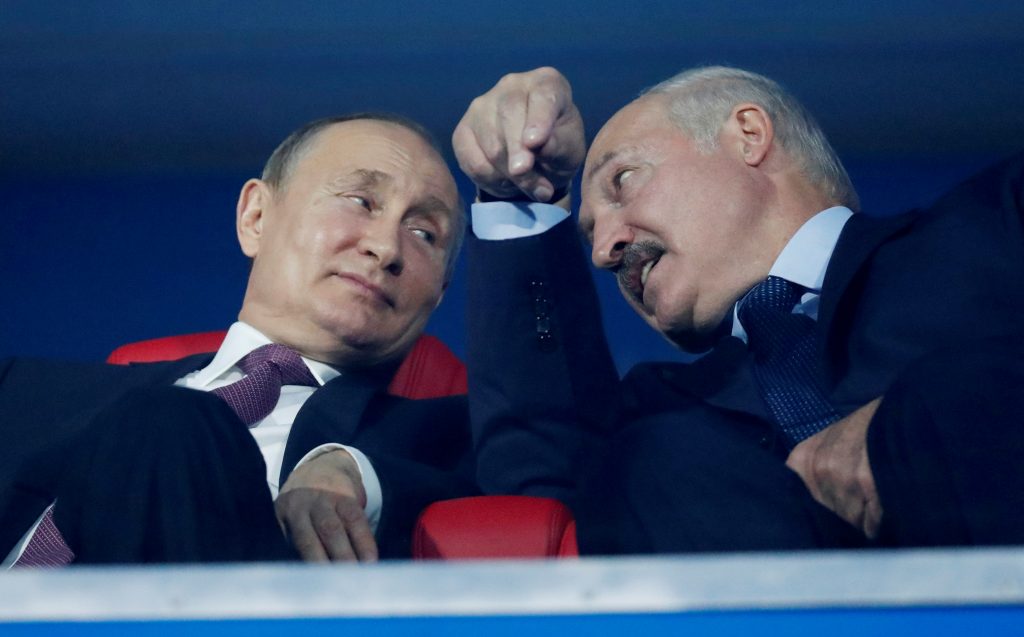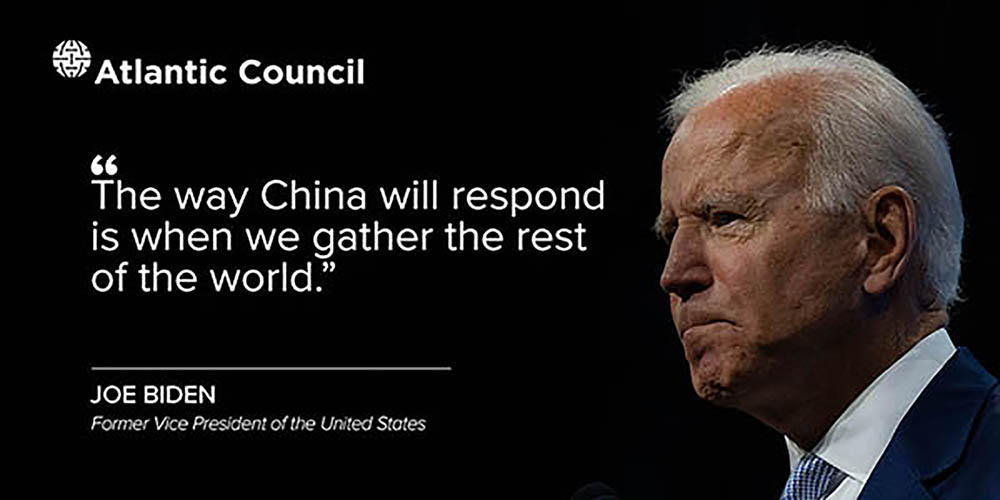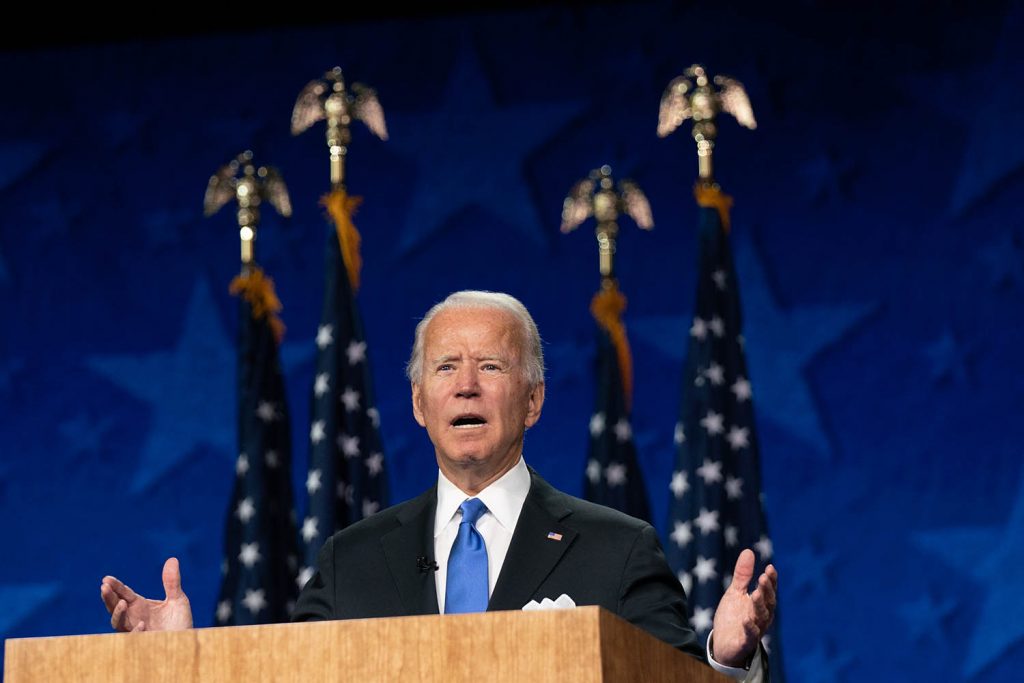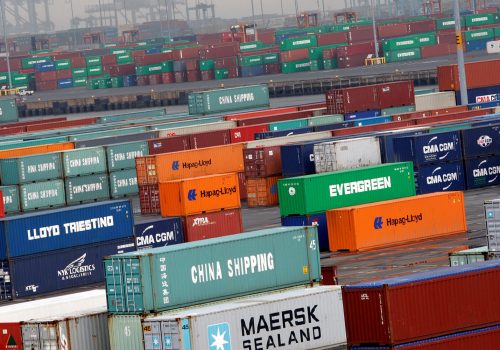The United States was still staggering from the Great Depression when polio-stricken Franklin Delano Roosevelt walked slowly and painfully to the podium at the East Portico of the Capitol to deliver his first inaugural speech on March 4, 1933.
The country’s GDP had fallen a third between 1929 and 1933, the stock market had lost 90% of its value, and the country had spiraled from full employment to 25% jobless. Just over a month earlier, Adolf Hitler had risen to power in Germany, and was already well on his way to establishing total control of the Third Reich, adding the Weimar Republic to the increasingly crowded graveyard of post-World War I democracies.
Early in the speech, FDR delivered the line enshrined in history that underscored the collective anxiousness of the nation he was addressing. “So, first of all, let me assert my firm belief that the only thing we have to fear,” said Roosevelt, pausing for dramatic impact, “is fear itself — nameless, unreasoning, unjustified terror which paralyzes needed efforts to convert retreat into advance.”
Yet the loudest cheer came not there, nor when Roosevelt excoriated the “money changers,” and condemned the “callous and selfish wrong-doing” of bankers and businessmen. Nor did it follow his praise for the enduring strength of the US Constitution, which itself was in danger, as “the most superbly enduring political mechanism the modern world has produced.”
Most troubling to his wife Eleanor, the most robust audience response came near the end of the speech, when Roosevelt vowed, with a grim countenance he had maintained throughout, that if all other measures he proposed proved inadequate, he would ask Congress for “broad Executive power to wage a war against the emergency, as great as the power that would be given to me if we were in fact invaded by a foreign foe.”
Get the Inflection Points Newsletter
Subscribe to Frederick Kempe’s weekly Inflection Points column, which focuses on the global challenges facing the United States and how to best address them.
That same afternoon in her new quarters at the White House, the First Lady slowly drew off her gloves and told her friend Lorena Hickock, one of the best-known female American journalists of her time, that she found the inauguration “very, very solemn and a little terrifying.” Speaking quietly, the First Lady particularly worried about the crowd’s delirious embrace of the possibility of wartime powers.
“You felt they would do anything — if only someone would tell them what to do,” she said.
It is at this time when a newly elected US president is again about to shape global history, for better or worse, that I took this summer to reflect upon lessons of a past when the United States faced economic threats, political divisions and rising authoritarian dangers that at times seemed insuperable.
The setting for these ruminations was a family vacation rental in Rehoboth, Delaware, which by no design of our own was down the street from presidential candidate Joe Biden’s summer home — and the Secret Service detail that protected it in the days after Biden retreated to Rehoboth following the convention where he accepted the nomination. So, after spending much of the last four years tracking world events and US policies during the Trump administration, I shifted my focus to conversations with Biden confidants and policy advisers on how the former vice president perceives our historic moment and what he would do to address it.
Readers of this column recognize that I consider the period we are navigating to be a historic inflection point equivalent to the periods following the two world wars in its potential to define the world for generations. That was true even before our 2020 witch’s brew of pandemic, recession and racial-cultural upheaval.
The good news is that the Biden team grasps the significance of the moment. They began by dissecting how much the context had changed since former President Barack Obama left office. Global democracies were on their back foot and China was not only rising but growing more assertive and authoritarian. Transnational threats had escalated, from climate to organized crime, but the rules and institutions to deal with them had weakened.
Add to that a technological revolution that will define our times, which offers everything from the dangers of the Chinese surveillance state to the opportunity of a clean energy future that saves the planet. The Biden team gets that tech by its nature is agnostic in the global competition of democratic and authoritarian systems, and that artificial intelligence can allow both to operate with greater efficiency.
Most encouraging is that Biden embraces as fundamental “the intersection between domestic policy and foreign policy, not as an abstract notion but as a strategy,” Jake Sullivan, a senior policy adviser to the Biden campaign, told the Atlantic Council’s Damon Wilson in a foundational interview.
Even as the US invests in infrastructure, innovation, workers, its immigration system and the strength of its democratic institutions, Sullivan says Biden would “put values and democracy back at the center of US foreign policy.” He would “rally like-minded free democratic nations in common purpose to both push back against authoritarian competitors and also construct and build the kind of long-term durable solutions for the challenges that afflict us all.”
Most intriguing is the Biden commitment to convene a global “summit of democracies” during his first year in office, perhaps based on the D-10 model (the world’s 10 largest democracies, a concept the Atlantic Council has advanced through the work of its Scowcroft Center).
The ambition would be to set priorities together on issues ranging from beating the pandemic and its economic aftershocks to dealing with the rise of China, the threat of climate change and fostering longer term approaches on everything from trade to technology. The regional priorities would be the Indo-Pacific, as the place of the future; Europe and the Atlantic community as the irreplaceable core; and the American continent as the promising but neglected neighborhood.
When Roosevelt delivered his 1933 inaugural, there were only 20 democracies against 130 autocracies. Democratic governance began to grow after World War II and then accelerated most dramatically after 1989 and the Cold War’s end toward a high point of 101 democracies and 78 autocracies in 2011.
The events of the next few years will determine whether democracy regains its footing, or the authoritarian shift accelerates. Those are the stakes — and the challenge is to achieve the best of outcomes while skirting the worst of consequences.
At the end of his 1933 inaugural, Roosevelt sought divine intervention: “May He protect each and every one of us. May He guide me in the days to come.”
However, even that didn’t allow him to avoid the Holocaust and World War II that would punctuate his presidency before the US would rally democracies to build a better future.
This article originally appeared on CNBC.com
Frederick Kempe is president and chief executive officer of the Atlantic Council. You can follow him on Twitter @FredKempe.

THE WEEK’S TOP READS
This week’s top reads include Jacob Schlesinger’s comparison of Biden and Trump China policies in the Wall Street Journal, Michael Carpenter and Vlad Kobets look in Foreign Affairs at Russia’s “boiling the frog” approach to Belarus and the New York Times’ look at the potential political cost of China’s vaccine diplomacy. Also don’t miss the Washington Post’s visit to some little known Taiwanese islands and their pro-Beijing constituency.
This week’s must-read comes from Pulitzer Prize winning author Daniel Yergin in the Weekend Wall Street Journal on the geopolitics of the energy transition and why China could win it.
#1. BIDEN AND CHINA
What’s Biden’s New China Policy? It Looks a Lot Like Trump’s
Jacob Schlesinger / THE WALL STREET JOURNAL
Kurt Campbell, the top Asia official from the Obama State Department and a Biden adviser, concedes “there is a broad recognition in the Democratic Party that Trump was largely accurate in diagnosing China’s predatory practices.”
Jacob Schlesinger in the WSJ quotes Biden aides that they would “expand the American-government backed campaign to compete in strategic high-tech sectors … to curb Chinese economic power and influence, and reduce interdependence.”
So how would Biden differ from Trump?
Biden says he’d rally a coordinated campaign to pressure Beijing. “We make up 25% of the world’s economy but we poked our finger in the eyes of our allies out there,” Biden said recently. “The way China will respond is when we gather the rest of the world.” Read More →
#2 “BOILING THE FROGS” IN BELARUS
What Russia Really Has in Mind for Belarus
Michael Carpenter and Vlad Kobets / FOREIGN AFFAIRS
Svetlana Alexievich is Not Going Anywhere
Masha Gessen / THE NEW YORKER
Atlantic Council non-resident fellow Michael Carpenter and Vlad Kobets lay out some smart thinking on Russia’s likely strategy on Belarus, which provides the necessary context for any who might may want to counter it.
“Moscow is aiming for something we have called ‘soft annexation,’” they write. “the strategy is to ‘boil the frog’ gradually, starting with economic integration and a common currency, followed by political integration through a common foreign and defense policy, and culminating in a full-fledged Union State that would mean the de facto absorption of Belarus into Russia.” Read More →
For those who believe the Belarus outcome could have outsized consequences, as do I, understanding the country, its culture and its players is of growing significance. In that spirit, don’t miss Masha Gessen’s look in the New Yorker at Svetlana Alexievich, the last, free remaining original member of the opposition’s coordinating council and the recipient of the 2015 Nobel Prize in Literature. Read More →
#3. CHINA’S VACCINE DIPLOMACY
From Asia to Africa, China Promotes Its Vaccines to Win Friends
Sui-Lee Wee / THE NEW YORK TIMES
No country understands better than China that whoever is the first mover in developing a patient-ready Covid-19 vaccine could reap significant diplomatic advantage. “The country is using the prospect of the drug’s discovery in a charm offensive aimed at repairing damaged ties and bringing friends closer in regions China deems vital to its interests,” writes Sui-Lee Wee in the New York Times.
China currently has four vaccine candidates in phase three trials, more than any other country including the United States. Beijing is finding many countries are interested in purchasing early access, and the political cost could be considerable.
Sui-Lee describes a transactional process to acquiring the vaccine. In July, for example, Philippines President Rodrigo Duterte “made a plea to Mr. Xi for help with vaccines,” she writes, and in the same breath “said he would not confront China over its claims to the South China Sea.”
The next day China confirmed early access. Read More →
#4. MEANWHILE, ON GREAT KINMEN ISLAND…
On China’s front line, emerging Cold War haunts battle-worn Taiwanese islands
Gerry Shih / THE WASHINGTON POST
Nothing beats front-line reporting from areas of consequential tension with unusual datelines. For that alone read the Washington Post’s Gerry Shih from “Great Kinmen Island, Taiwan,” just three miles off the People’s Republic of China coastline.
“In many ways, Kinmen is a geographic and political outlier in Taiwan,” writes Shih, of this most pro-Beijing constituency of Taiwan, where officials have even considered building a bridge to the mainland. “In other ways, it’s a microcosm of Taiwan’s existential and generational debates over China — and all the insoluble questions of politics and commerce, of culture and shared blood,” writes Shih.
If the situation around Taiwan escalates, don’t forget the murkiness over Kinmen as the United States, which has committed itself to take “appropriate action” in the event of a Chinese attack on Taiwan, didn’t include the islands under a foundational defense treaty with Taipei.
Who knew? Read More →
#5. THE WINNER OF THE ENERGY TRANSITION?
The New Geopolitics of Energy
Daniel Yergin / THE WALL STREET JOURNAL
This week’s must read is Dan Yergin’s brilliant look on the cover of the WSJ Weekend’s Review section at how the coming, historic transition from oil, natural gas and coal toward renewables, will drive geopolitics.
“China is poised to be the big winner, Russia and Middle East oil exporters the big losers. The U.S. is likely to fall somewhere in between,” writes Yergin, in an article adapted from his hot-off-the-presses book, “The New Map: Energy, Climate and the Clash of Nations.”
He warns us that energy transitions take time. The first took over two centuries “before coal overtook wood and waste as the world’s number one fuel.” And though oil was discovered in western Pennsylvania in 1859, oil replaced coal as the top energy resource a century later.
“Of course, there was nothing in those previous centuries to compare to the weight of government policy, money, activism and technical wizardry that is pushing the energy transition today,” writes Yergin. Read More →
Read the article. Buy the book here!
QUOTE OF THE WEEK

ATLANTIC COUNCIL TOP READS
Image: Joe Biden accepted the Democratic presidential nomination on August 20, 2020. (REUTERS)



